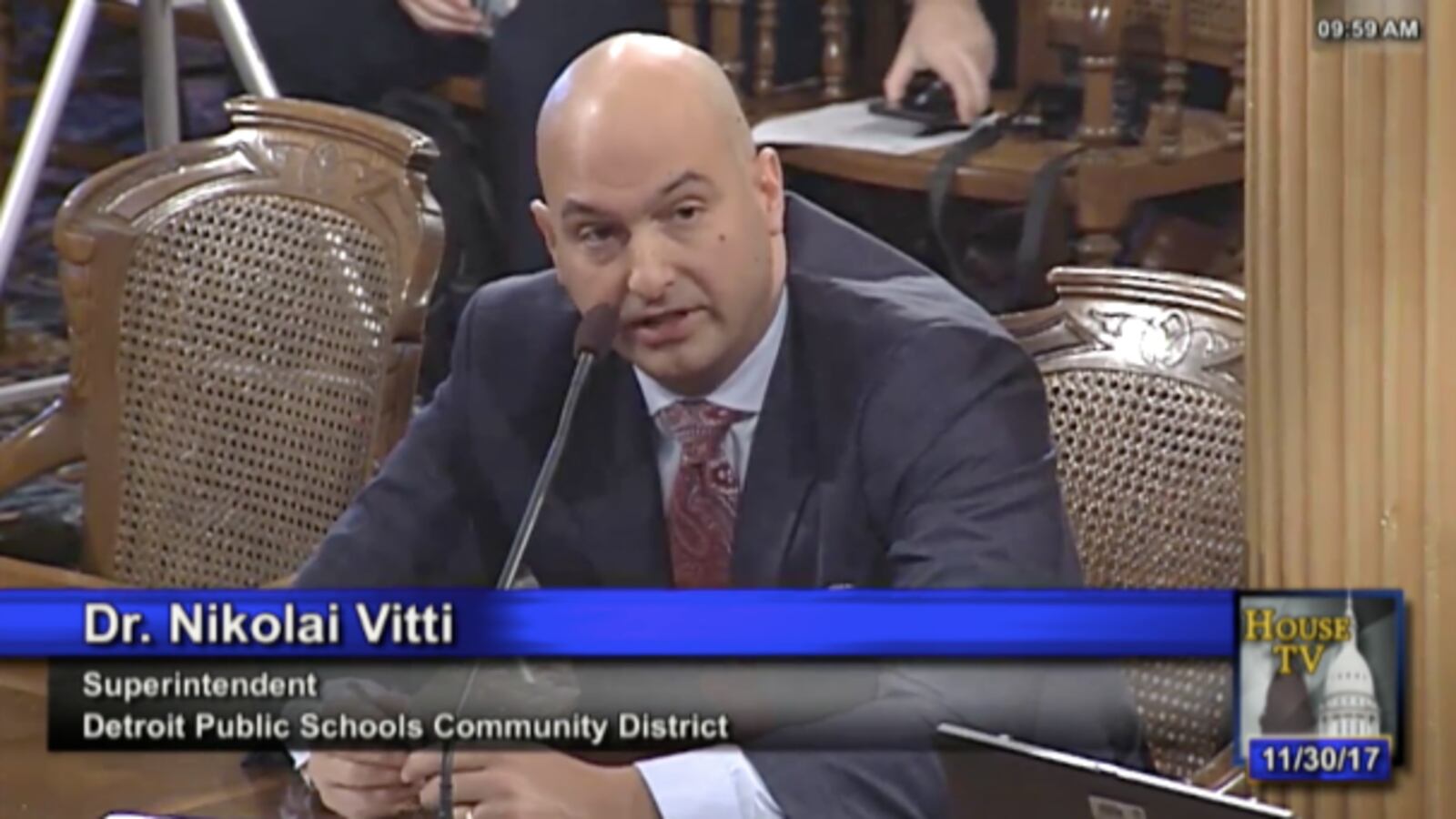If there was anyone in Detroit hoping that a new superintendent might improve relations between the city’s main school district and Lansing lawmakers, they should brace themselves.
In his first appearance before the legislature since taking over the Detroit schools last spring, schools chief Nikolai Vitti faced hostile questions from GOP lawmakers Thursday who accused him of “blatantly” violating several laws and grilled him on his dealings with charter schools.
Specifically, lawmakers on the House Education Reform committee criticized Vitti for not creating a legally required merit pay program for teachers and for not implementing an A-F grading system for Detroit schools that could be used to shutter the lowest-performing schools.
“You are intentionally violating the law,” said Rep. Daniella Garcia, a Republican from western Michigan who was one of the authors of legislation that sent $617 million to Detroit last year to create the new debt-free Detroit Public Schools Community District.
That legislation included several measures that supporters said would ensure the money was being well spent, including the A-F grading system for Detroit schools. But the law spells out that the state’s School Reform Office is responsible for implementing that system, not Vitti or the district.
The law — full text here — says that the letter grade system should apply to both district and charter schools. Vitti says he’s open to a letter grade accountability system but said he believes that system should apply to all Michigan schools, not just those in the Detroit. He said he didn’t think closing schools — like the 24 district schools that were threatened with closure last year under the same law — would improve education since few children were likely to land in better schools given the scarcity of quality options in the city.
On merit pay, he said he’s not opposed to basing teacher pay on performance but said he hasn’t yet negotiated a system with the teachers union for deciding how to determine which teachers will get extra pay.
Vitti also took heat for his vocal public battle with Detroit charter schools. Many GOP lawmakers are strong charter school backers and are allies of U.S. Education Secretary Betsy DeVos who has used her family’s wealth to support charter schools and other choice options in Michigan.
The chair of the committee where Vitti was testifying is Rep. Tim Kelly who nearly left the legislature to work in Washington for DeVos. He lost the job earlier this month over offensive blog posts.
In the hearing Thursday, lawmakers took particular issue with Vitti’s refusal to sign off on the sale of a former district school to a local charter school.
The Detroit Prep Academy has been trying to buy the former Joyce Elementary School in the city’s Pingree Park neighborhood from a private developer who bought it from the school district in 2014.
The property has a deed restriction that requires the district to sign off any sale of the building in exchange for a cut of the proceeds — in this case $75,000. Vitti has refused to sign off on the sale, saying he first needs to conduct a city-wide review of school properties to determine where school buildings are needed.
“There are multiple schools in that area, traditional and charter, and there’s a question of whether there’s a need” for another school, Vitti told Chalkbeat after the hearing.
Signing off on the sale to Detroit Prep would “set a precedent with the court regarding our ability to determine the future of property owned by the local Detroit taxpayers. That’s ultimately the bigger issue here … We should be able to determine how our property will be utilized … that’s a fundamental right in American law.”
The charter school has filed a lawsuit against the district, which Garcia cited in questioning Vitti.
“You are not being fiscally responsible with the money we gave you to pursue a lawsuit,” Garcia said.
Kelly noted that lawmakers had passed a law barring deed restrictions on school buildings like the former Joyce school.
“The reality is that deed restrictions are illegal now,” Kelly said. “Whether you like them or not, it is state law.”
But Vitti questioned whether that law was enforceable and suggested he planned to fight it in court.
“I’m glad we have a court system,” he said.
After the hearing, Vitti said he doesn’t take the hostility personally.
“There’s a long history here that’s larger than me and a number of complicated issues,” he said.
He’s aware that the legislature has power over funding and policies but said he needs to be a forceful advocate for his district.
“If creating relationships and getting things done in Lansing means sacrificing the best interests of the district, I can’t do that,” Vitti said.
Vitti said he was glad to have a platform to share the work he’s doing, even if parts of the discussion were heated.
“I think they walked away with the impression that I’m skilled, that I have a track record and that I’m serious about reform but unfortunately with some members there’s an ideological gap.”
Kelly, who has been critical of the Detroit schools and has advocated for the district to be abolished, said lawmakers are “tired of having people disregard laws that we make.”
Though he acknowledged that the School Reform Office is tasked with setting up letter grades, not the district, he asserted that Vitti and the Detroit school board “are not helpful.”
“They don’t respect what goes on in Lansing,” Kelly told Chalkbeat after the hearing. “Not just Vitti, but their board. Everything has been adversarial … It’s unfortunate because this is the largest district in the state. They’re clearly using the largest majority of funds. And kids are there and these kids are not getting the education they deserve.”
Watch the full recording of Vitti’s testimony here.

